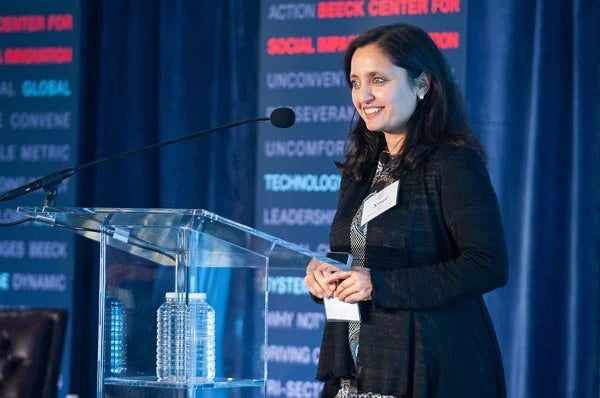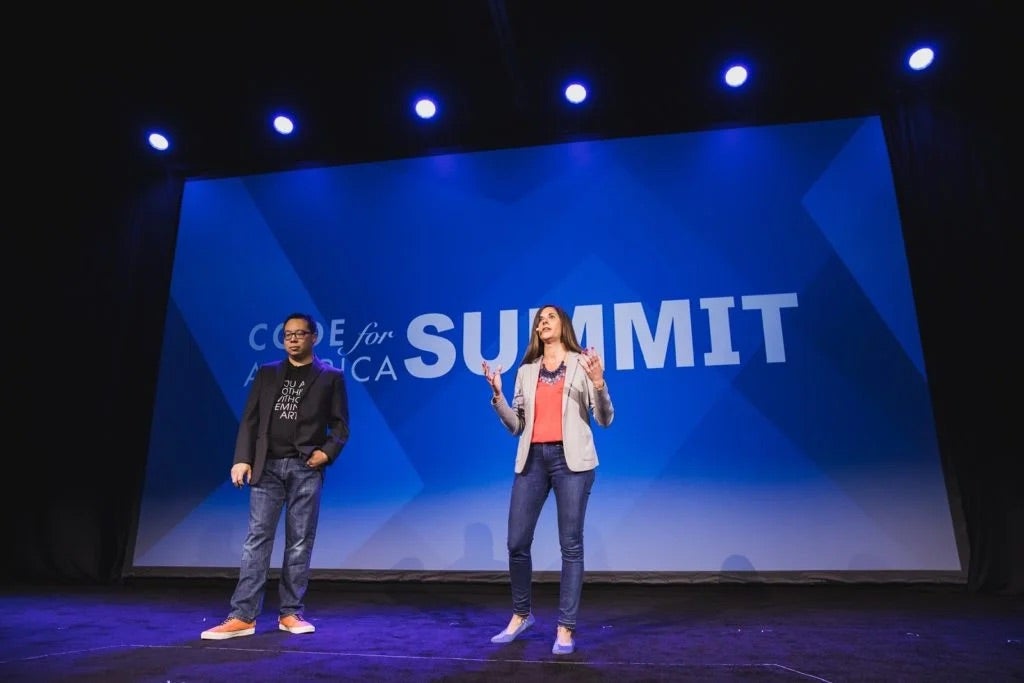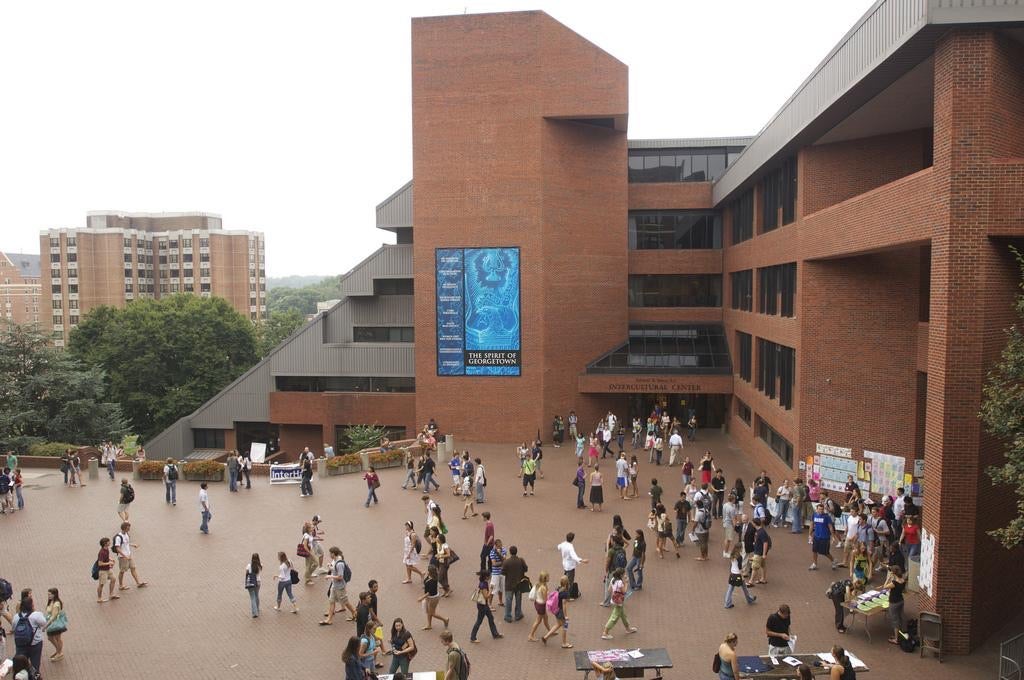A Decade of Impact: How Sonal Shah built and led the Beeck Center with an ethos of ‘do it differently’
This is Part II of a three-part series exploring a decade of impact at the Beeck Center. Read Part I and Part III.
Late into the night on February 10, 2014, Sonal Shah sat on the floor of room 100 in the Intercultural Center on Georgetown University’s main campus, surrounded by half-built office furniture, mismatched chairs, and crowds of students. It was the eve of the Beeck Center for Social Impact + Innovation’s official launch day and, despite exhaustion, the energy of the group was electric with possibility.
“Nobody was focused on how nice the space looked as much as we were focused on having a space and showing that we were a real place,” Shah said.
Two years earlier, Shah had been leading the White House Office for Social Innovation and Civic Participation when she got a call from Olga María and Alberto Beeck, Carl Muñana, and Georgetown University Provost Robert Groves. The group described an idea for a new kind of center; one that would be based at Georgetown, but would not be tied to a particular school within the university, nor would its scope be limited to a specific subject, faculty member, or theory of change. By design, it would break down academic silos, experiment with ideas, and—most importantly—train the next generation of changemakers to have the greatest impact on the greatest number of people.
“Sonal is a person who is entrepreneurial by nature and who works well with a variety of collaborators,” Provost Groves said. “She and the Beeck Center were a perfect match given her ability to think strategically.”

Shah’s career had been as agile and multi-faceted as the Beeck Center itself would grow to become under her leadership. She led Goldman Sachs’ environmental strategy and Google’s global technology and impact investment initiatives, and had served as the interim vice president of United Way Worldwide, among other crucial roles across academia, government, and the private and philanthropic sectors.
More important than her resume, though, was her mindset as a changemaker and outside-the-box thinker.
“I’m always counterculture in large institutions,” Shah said. “Whether it’s in the White House or Treasury or in large institutional settings, I’m always asking, ‘Why are we doing things the way we are doing them? Why can’t we do it differently?’”
Planting the Seeds of Change
“Differently” was precisely how Shah approached the early days of the Beeck Center as its founding executive director. With GU Impacts already up and running as the Beeck Center’s first program, Shah, Provost Groves, and the Beecks started hypothesizing about what it would look like to involve students in social impact and public service efforts beyond a 10-week summer project. Shah met with deans and professors across campus, and began utilizing the course she was teaching on leadership and social impact to recruit students to work at Beeck in what would eventually become the role of “student analyst.” These students would work and learn side-by-side with experts in topics and fields ranging from impact investing, to fair finance, to data and technology and everything in between, all while engaging in changemaking across the university.
“We threw a lot of spaghetti on the wall,” she said. “But our North Star was always the students.”
Within this experiential environment, students would learn to succeed and fail, experiment and iterate, and build the knowledge and confidence base necessary to go out into the world and make a meaningful impact. For Shah, there was no better-suited pool of aspiring changemakers than the students at Georgetown, who come to the university for its “both into one” motto and commitment to serving others.
“You can’t teach that—that’s the sort of ethos that a student comes here with, and it is instilled in every student at Georgetown,” Shah said.
Through it all, the physical space on campus remained the beating heart of the center. True to its founding ethos, the center didn’t belong to one person, idea, or purpose. On any given day you could find students drawing murals with dry-erase markers on the walls, networking with guest lecturers, or brainstorming with staff members on their next big project.
“Everyone can think about social impact no matter their discipline. It’s the intentionality you bring to the work.”
Sonal Shah
By maintaining this open door, cross-disciplinary environment, the Beeck Center was able to reach a far greater number of students than just the ones who engaged in project work with the dozens of Beeck Center fellows and researchers. Anyone who walked through the doors would walk away with a new curiosity about and understanding of the Beeck approach to social impact.
“Everyone can think about social impact no matter their discipline,” Shah said. “It’s the intentionality you bring to the work.”
Cultivating a Community of Impact
As the Beeck Center matured, Shah and the team she had meticulously built over the first five years of the center’s existence deepened their commitment to the Beecks’ original mandate of creating the greatest impact for the greatest number of people. The addition of Cori Zarek—a public interest technologist with deep experience in government, civil society, and the tech sector—to the Beeck Center in 2019 paved the way for an expansion of the center’s Data + Digital portfolio, which focused on action-oriented research and project work using data and technology for greater impact.
“Social impact and innovation in this century has to have a technology base,” Provost Groves said. “Everything is technology-informed.”
In 2021, Shah passed the torch to Zarek to lead the Beeck Center into its next phase as an organization committed to improving systems for all using the tools of data, design, policy, and technology.
“I came in with a point of view that we needed to turn the corner into becoming a more unified and aligned organization with a narrowed and focused body of work,” Zarek said. “In many ways, it was a continuation of the work we’d always done, but we were drilling down into a more targeted set of activities.”

Those activities included building out the Beeck Center’s capacity and expertise as a convener and network hub through the State Chief Data Officers Network, the Digital Benefits Network, and the Digital Service Network. It also meant increasing data capacity in state and local governments and community-based organizations, supporting and upskilling the public interest technology workforce, and establishing new approaches for digital identity or open source software in government.
As the Beeck Center navigated its way through the COVID-19 pandemic and the implications it had on the fragile digital infrastructure of the systems underpinning people’s lives, the team continued to embrace its agile and experimental nature, helping state governments utilize American Rescue Plan Act funds to modernize their systems and practices.
The throughline in each iteration of the work remained the symbiotic relationship between Beeck Center fellows, staff, and student analysts. Maintaining a supportive, curious, and ever-adapting environment for the next generation of social impact leaders to learn, create, and problem solve with the current generation became a recipe that could be replicated across the Georgetown community.
“What the Beeck Center pioneered is now just kind of how the university works,” Zarek said. “Experiential learning is in Georgetown’s DNA at this point.”

_____________________________________________
Stay tuned for Part III of this three-part series exploring a decade of impact at the Beeck Center.